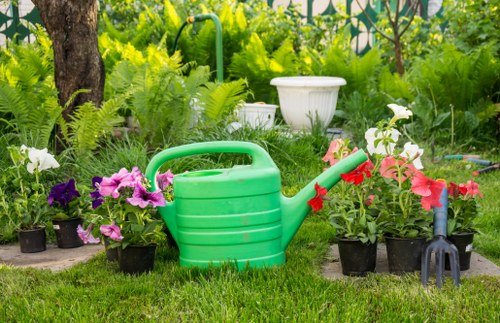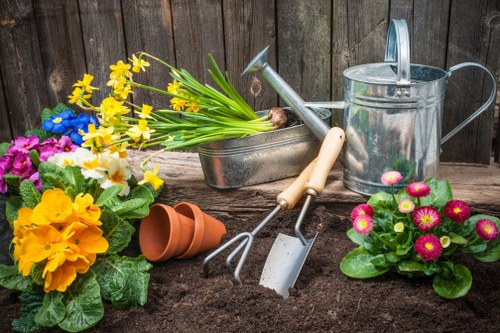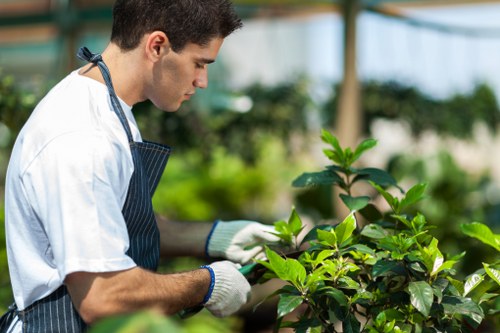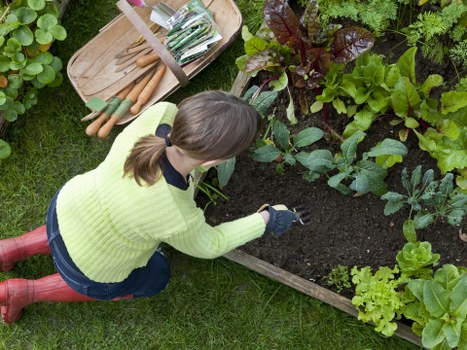Transforming Your Outdoor Space: Landscape Gardening in Mottingham

Welcome to the world of landscape gardening in Mottingham, where your outdoor spaces are transformed into stunning, functional, and sustainable environments. Whether you're looking to create a serene garden retreat, a vibrant entertainment area, or a lush green sanctuary, Mottingham offers a unique blend of opportunities and challenges for every gardening enthusiast.
Mottingham, with its picturesque views and diverse climate, provides the perfect backdrop for a variety of gardening styles. From traditional English gardens to contemporary designs, the possibilities are endless. But what makes landscape gardening in Mottingham stand out is the community's dedication to maintaining the beauty and ecological balance of the area.
Embarking on a landscape gardening project in Mottingham requires careful planning and consideration of several factors, including soil quality, local flora, and sustainable practices. Understanding these elements can help you create a garden that not only looks amazing but also thrives year-round.

Understanding the Basics of Landscape Gardening
Before diving into specific projects, it's essential to grasp the fundamentals of landscape gardening. This involves more than just planting flowers; it's about designing a space that harmonizes with the natural environment and meets your personal preferences.
Landscape gardening combines art and science to create aesthetically pleasing and functional outdoor spaces. It encompasses various aspects such as plant selection, garden structures, water features, and hardscaping elements like pathways and patios.
In Mottingham, the goal is to blend these elements seamlessly with the existing landscape, taking into account the area's unique characteristics and your specific needs.

Choosing the Right Plants for Mottingham Gardens
Plant selection is a critical component of successful landscape gardening. In Mottingham, the climate and soil conditions play a significant role in determining which plants will thrive.
Here are some tips for selecting the right plants:
- Climate Compatibility: Choose plants that are well-suited to Mottingham's temperate climate. Consider factors like temperature, rainfall, and seasonal changes.
- Soil Health: Conduct a soil test to determine pH levels and nutrient content. This will help you select plants that can thrive in your garden's specific soil conditions.
- Native Species: Incorporate native plants into your garden design. They are more likely to thrive with minimal maintenance and support local wildlife.
- Maintenance Requirements: Consider the level of care each plant requires. If you prefer low-maintenance gardens, opt for plants that are hardy and drought-resistant.

Designing Your Garden Layout
A well-thought-out garden layout is the foundation of any successful landscape project. In Mottingham, design considerations should reflect both aesthetic appeal and functionality.
Start by assessing the space you have available. Measure the area and note existing features such as trees, shrubs, and architectural elements. This will help you visualize how different components can be integrated.
Key Elements to Consider
- Paths and Walkways: Design pathways that guide visitors through your garden, highlighting key areas and providing easy access.
- Seating Areas: Incorporate benches, gazebos, or outdoor furniture to create comfortable spots for relaxation and socializing.
- Focal Points: Use features like water fountains, sculptures, or unique plants to draw attention and add interest to your garden.
- Plant Beds: Organize plants into beds based on their sunlight and water requirements. This not only enhances the visual appeal but also simplifies maintenance.

Sustainable Practices in Landscape Gardening
Embracing sustainability in your garden design is crucial for creating an eco-friendly and resilient landscape. Sustainable landscaping practices help conserve resources, reduce waste, and support biodiversity.
Here are some sustainable practices to consider:
- Rainwater Harvesting: Install rain barrels or other systems to collect and store rainwater for irrigation purposes.
- Native Planting: As mentioned earlier, native plants require less water and are more resistant to local pests and diseases.
- Composting: Create a compost pile to recycle garden waste and enrich your soil naturally.
- Mulching: Apply organic mulch to retain soil moisture, suppress weeds, and improve soil health.
- Energy-Efficient Lighting: Use solar-powered or LED lighting to reduce energy consumption while illuminating your garden.

Incorporating Hardscaping Elements
Hardscaping elements add structure and functionality to your garden. They complement the soft elements like plants and flowers, creating a balanced and cohesive design.
Common hardscaping features include:
- Patios and Decks: Provide spaces for outdoor dining, entertaining, and relaxation.
- Paths and Walkways: Define movement within the garden and connect different areas.
- Fences and Walls: Offer privacy, security, and a backdrop for climbing plants.
- Water Features: Enhance the aesthetic appeal with ponds, fountains, or streams.
- Outdoor Structures: Incorporate pergolas, arbors, or sheds for added functionality and style.
Materials to Consider
Choosing the right materials is essential for durability and aesthetic harmony. Popular materials for hardscaping in Mottingham include:
- Natural Stone: Offers a timeless look and blends well with the natural environment.
- Brick: Provides a classic appearance and is highly durable.
- Wood: Adds warmth and can be used for decking, fencing, and structures.
- Concrete: Versatile and cost-effective, suitable for various applications.
- Metal: Ideal for modern designs and can be used for decorative elements.

Creating Functional Outdoor Spaces
Designing functional outdoor spaces involves understanding how you intend to use your garden and tailoring the layout to meet those needs.
Types of Functional Spaces
- Entertainment Areas: Designate spaces for hosting gatherings, complete with seating, lighting, and possibly a BBQ area.
- Relaxation Zones: Create tranquil spots with comfortable seating, shade structures, and calming elements like water features or gardens.
- Play Areas: If you have children, allocate space for playground equipment, sandboxes, or sports activities.
- Vegetable Gardens: Incorporate raised beds or dedicated plots for growing your own herbs, vegetables, and fruits.
- Workspaces: Set up areas for gardening, outdoor cooking, or other hobbies.
By thoughtfully planning these spaces, you can ensure that your garden meets both aesthetic and practical needs.

Maintaining Your Landscape Garden
Maintenance is key to keeping your landscape garden in Mottingham looking its best year-round. Proper upkeep ensures that plants thrive, hardscaping elements remain in good condition, and the overall design stays harmonious.
Essential Maintenance Tips
- Regular Pruning: Trim shrubs and trees to maintain their shape and promote healthy growth.
- Weed Control: Keep weed species at bay to prevent them from competing with your desired plants.
- Irrigation Management: Ensure that your garden receives adequate water without overwatering. Consider installing an efficient irrigation system.
- Soil Health: Amend the soil with compost or other organic matter to maintain fertility and structure.
- Pest Management: Monitor for pests and implement eco-friendly control measures as needed.
Seasonal Care
Different seasons bring unique challenges and opportunities for garden maintenance:
- Spring: Plant new blooms, fertilize, and prepare for the growing season.
- Summer: Focus on watering, weeding, and managing garden pests.
- Autumn: Prune plants, clean up fallen leaves, and prepare for winter.
- Winter: Protect sensitive plants, plan for the next season, and perform structural maintenance on hardscaping elements.

Enhancing Biodiversity in Your Garden
Promoting biodiversity in your landscape garden not only benefits the environment but also adds vibrancy and resilience to your outdoor space.
Strategies for Enhancing Biodiversity
- Plant Diversity: Incorporate a wide range of plant species to attract different pollinators and wildlife.
- Habitat Creation: Provide habitats for birds, insects, and other creatures through birdhouses, insect hotels, and water features.
- Native Species: As previously mentioned, native plants support local ecosystems and reduce the need for maintenance.
- Organic Practices: Use organic fertilizers and pest control methods to maintain a healthy ecosystem.
- Minimal Chemical Use: Limit the use of pesticides and herbicides to protect beneficial insects and soil health.
Benefits of Biodiversity
Enhancing biodiversity leads to a more stable and resilient garden. Diverse plant life can reduce pest outbreaks, improve soil health, and create a more visually interesting landscape.

Incorporating Water Features
Water features add a soothing element to your landscape garden, enhancing both its aesthetic appeal and functionality.
Types of Water Features
- Ponds: Create a focal point with a serene pond, supporting aquatic plants and wildlife.
- Fountains: Add the soothing sound of flowing water with a decorative fountain.
- Streams: Integrate a natural-looking stream to guide water through your garden.
- Waterfalls: Install a waterfall to add movement and ambiance to your outdoor space.
- Rain Chains: Use rain chains as a stylish alternative to traditional downspouts, guiding rainwater gracefully.
Benefits of Water Features
Water features can:
- Enhance the visual appeal of your garden.
- Attract wildlife such as birds and butterflies.
- Create a calming and relaxing atmosphere.
- Improve the microclimate of your garden by increasing humidity.
- Provide habitat for beneficial aquatic organisms.

Lighting Your Landscape Garden
Proper lighting can transform your landscape garden, making it enjoyable at night and highlighting key features.
Types of Outdoor Lighting
- Path Lighting: Illuminate walkways and paths for safety and to guide visitors.
- Spotlights: Highlight specific plants, trees, or architectural elements.
- Ambient Lighting: Create a warm and inviting atmosphere with string lights or lanterns.
- Accent Lighting: Use lighting to add drama and depth to your garden design.
- Security Lighting: Enhance safety around your property with motion-activated lights.
Energy-Efficient Options
Consider eco-friendly lighting solutions to reduce energy consumption and minimize environmental impact:
- Solar-Powered Lights: Harness the sun's energy to power your garden lights.
- LED Lighting: Utilize LED bulbs for long-lasting and energy-efficient illumination.
- Timers and Sensors: Automate your lighting system to operate only when needed, conserving energy.

Integrating Garden Structures
Garden structures add functionality and aesthetic interest to your landscape. They provide support for plants, create defined spaces, and enhance the overall design.
Popular Garden Structures
- Arbors and Pergolas: Offer support for climbing plants and create shaded walkways or seating areas.
- Gazebos: Provide sheltered spaces for relaxation and entertainment.
- Garden Sheds: Offer storage for tools and equipment, keeping your garden organized.
- Greenhouses: Enable year-round gardening by protecting plants from harsh weather.
- Trellises: Support plants like vines and vegetables, adding vertical interest to your garden.
Choosing the Right Materials
Select materials that complement your garden's design and are suitable for Mottingham's climate:
- Wood: Provides a natural look but requires regular maintenance to prevent rot and decay.
- Metal: Durable and modern, ideal for sleek garden structures.
- Stone: Offers a timeless and robust option for permanent structures.
- Recycled Materials: Eco-friendly options like reclaimed wood or repurposed metal.

Maximizing Small Garden Spaces
Even with limited space, you can create a beautiful and functional landscape garden in Mottingham. Strategic planning and creative design can make small gardens feel expansive and inviting.
Design Tips for Small Gardens
- Vertical Gardening: Utilize walls, fences, and trellises to grow plants vertically, maximizing space.
- Compact Plant Varieties: Choose dwarf or compact plant varieties that fit well in smaller areas.
- MULTI-FUNCTIONAL Spaces: Design areas that serve multiple purposes, such as a seating area that doubles as a planting bed.
- Mirrors and Reflective Surfaces: Create the illusion of more space by incorporating mirrors or shiny surfaces.
- Minimalist Design: Embrace simplicity with clean lines and uncluttered layouts.
Smart Storage Solutions
Keeping your small garden organized is essential:
- Hidden Storage: Use benches or planters with built-in storage compartments.
- Vertical Shelving: Install shelves on walls to store tools and accessories.
- Multi-Purpose Furniture: Invest in furniture that offers storage, such as tables with drawers.

The Role of Professional Landscape Gardeners
While DIY gardening can be rewarding, professional landscape gardeners bring expertise and experience that can take your Mottingham garden to the next level.
Benefits of Hiring Professionals
- Expertise: Professionals have in-depth knowledge of plant selection, garden design, and maintenance practices.
- Time-Saving: Hiring a gardener frees up your time to enjoy the garden rather than laboring over it.
- Customized Designs: Professionals can create bespoke designs tailored to your specific needs and preferences.
- Quality Execution: Ensure high-quality installation of plants, structures, and hardscaping elements.
- Ongoing Maintenance: Many professionals offer maintenance services to keep your garden looking pristine year-round.
Choosing the Right Gardener
When selecting a landscape gardener in Mottingham, consider the following:
- Experience and Portfolio: Review their past projects to assess their style and expertise.
- References and Reviews: Seek feedback from previous clients to gauge satisfaction levels.
- Licensing and Insurance: Ensure they are properly licensed and insured to protect your property.
- Communication: Choose a gardener who listens to your ideas and communicates clearly throughout the project.
- Budget: Discuss pricing upfront and ensure their services align with your budget.

Embracing Seasonal Changes
Mottingham experiences distinct seasonal changes that can greatly influence your landscape garden. Embracing these changes ensures that your garden remains vibrant and functional throughout the year.
Spring Gardening
- Planting new flowers and vegetables.
- Pruning trees and shrubs.
- Preparing soil with compost and fertilizers.
Summer Gardening
- Regular watering and mulching.
- Managing pests and diseases.
- Harvesting mature plants and vegetables.
Autumn Gardening
- Planting bulbs for spring blooms.
- Cleaning up fallen leaves and debris.
- Protecting plants from early frosts.
Winter Gardening
- Pruning dormant plants.
- Planning next year’s garden layout.
- Maintaining garden structures and tools.
By adapting your gardening practices to the seasons, you can ensure a healthy and flourishing landscape garden in Mottingham all year long.

Incorporating Edible Gardens
Adding an edible component to your landscape garden can be both rewarding and practical. Growing your own herbs, vegetables, and fruits not only provides fresh produce but also enhances the garden's aesthetic appeal.
Benefits of Edible Gardening
- Fresh Produce: Enjoy the convenience of harvesting fresh herbs and vegetables right from your garden.
- Health Benefits: Edible gardens encourage healthy eating and provide opportunities for physical activity.
- Educational: Gardening is a great way to learn about plant biology, ecology, and sustainability.
- Economic Savings: Grow your own produce to save money on groceries.
- Environmental Impact: Reduce your carbon footprint by growing food locally.
Planning Your Edible Garden
To successfully incorporate an edible garden into your landscape, follow these steps:
- Site Selection: Choose a location with adequate sunlight, preferably 6-8 hours daily.
- Soil Preparation: Ensure the soil is rich in nutrients and well-draining. Amend with compost as needed.
- Plant Selection: Choose a variety of plants that suit your climate and soil conditions. Consider companion planting to enhance growth and deter pests.
- Irrigation: Set up an efficient watering system to keep your plants hydrated.
- Maintenance: Regularly weed, prune, and monitor your plants for any signs of stress or disease.

Integrating Art and Decor
Art and decorative elements can add unique character and charm to your landscape garden in Mottingham. These features reflect your personal style and enhance the overall ambiance of your outdoor space.
Types of Garden Art
- Sculptures: Introduce focal points with sculptures that complement the garden’s theme.
- Mosaic Pathways: Create colorful and intricate walkways using mosaic tiles.
- Garden Statues: Place statues strategically to add visual interest and narrative to your garden.
- Decorative Pots: Enhance plant displays with stylish and colorful pots.
- Wind Chimes: Add a musical element that enhances the sensory experience of your garden.
Choosing the Right Decor
Select decor that harmonizes with your garden’s design and your personal aesthetic:
- Theme Consistency: Ensure that art pieces align with the overall theme, whether it’s modern, rustic, or traditional.
- Material Durability: Use weather-resistant materials to ensure longevity.
- Scale and Proportion: Choose sizes that complement the garden without overwhelming other elements.

Creating Privacy in Your Garden
Privacy is an essential aspect of any landscape garden, providing a secluded and comfortable space for relaxation and enjoyment.
Methods to Enhance Privacy
- Planting Hedges: Tall, dense hedges offer natural barriers against prying eyes.
- Using Fencing: Install fences or screens for added privacy and security.
- Trellises and Pergolas: Incorporate structures covered with climbing plants to create secluded areas.
- Strategic Layout: Design the garden layout to include private nooks and quiet zones.
- Garden Walls: Build walls to enclose and define your garden space.
Choosing Privacy Plants
Select plants that grow tall and thick to effectively block views:
- Boxwood: Ideal for formal hedges and topiaries.
- Hedges of Privet: Fast-growing and dense, perfect for privacy screens.
- Evergreen Trees: Provide year-round privacy with their dense foliage.
- Climbing Vines: Such as ivy or wisteria, which can cover trellises and pergolas.

Incorporating Sustainable Materials
Using sustainable materials in your landscape garden reduces environmental impact and promotes eco-friendly practices.
Types of Sustainable Materials
- Recycled Stone: Utilize stones reclaimed from old buildings or natural sources.
- Sustainable Wood: Choose wood from responsibly managed forests or reclaimed wood.
- Recycled Metal: Use recycled metal for garden structures and decorative elements.
- Compostable Mulches: Opt for organic mulches that enrich the soil as they decompose.
- Sustainable Fabrics: Use eco-friendly fabrics for garden furniture and structures.
Benefits of Sustainable Materials
Incorporating sustainable materials offers several advantages:
- Environmental Impact: Reduces waste and conserves natural resources.
- Durability: Many sustainable materials are long-lasting and require less maintenance.
- Aesthetic Appeal: Adds unique textures and character to your garden design.
- Cost-Effectiveness: Often more affordable in the long run due to their durability and low maintenance needs.

Final Thoughts on Landscape Gardening in Mottingham
Embarking on a landscape gardening journey in Mottingham is a fulfilling endeavor that enhances both your property's value and your quality of life. By thoughtfully planning your garden, selecting the right plants, and incorporating sustainable and aesthetic elements, you can create a beautiful and resilient outdoor space.
Whether you choose to work with a professional landscape gardener or take a DIY approach, the key is to stay inspired and enjoy the process of transforming your garden into a personal oasis.
Contact us today to start planning your dream landscape garden in Mottingham and take the first step towards creating an extraordinary outdoor environment.